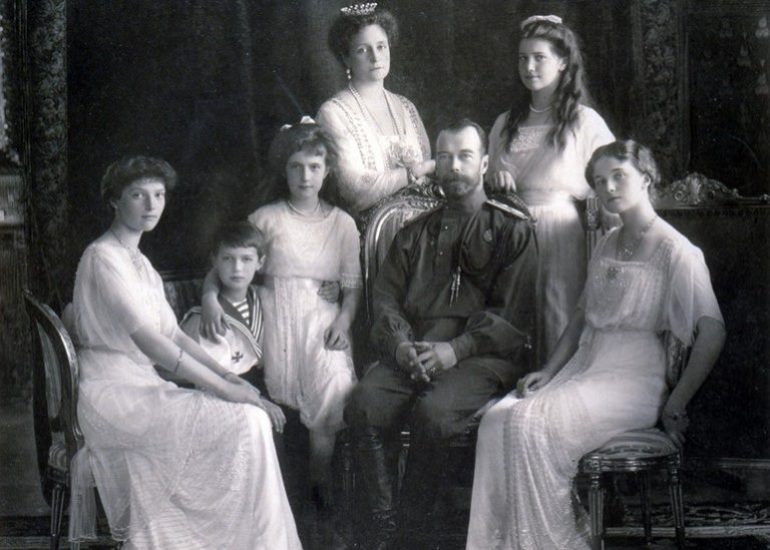At night on July 16th 1918 in the basement of Ipatiev house in Yekaterinburg the Family of Nicholas the Second and a few of their attendants were executed by the order of the executive committee for the Ural Regional Council of Workers, Peasants and Military Deputies headed by the Bolsheviks. Yakov Yurovsky, a member of the Council, was in charge of the execution. Here is his story, simple and scary.
On July 15 I started to get ready, since everything had to be done quickly. I decided to employ as many people as there were shootees, gathered them, told them what it was all about and said that we had to get ready, because we would need to do it properly once we got the final instructions. I have to say that executing people by fire squad is not as easy as one may think. It doesn’t happen at a battlefield, it happens in, so to say, peaceful environment. That is exactly why two Latish people refused at the last moment – they didn’t have the nerve.
Emperor Nicholas II with his family. Photo: glavnayatema.com
In the morning on July 16th I sent away the cook-boy Sednev on the pretext that he had to see his uncle. This made the arrestees worry. Their invariable messenger Botkin and later one of the daughters inquired where he had gone and why, how long would Sednev be away. Alexei was said to me missing him. Having received clarifications they left seemingly satisfied. I prepared 12 guns, explained who would shoot whom. Comrade Filipp [Goloshchyokin] warned me that at 12 at night a truck would arrive, the people would say the password, we would have to let them in, give them the corpses, which would be carried away and buried. At about 11 at night on the 16th I gathered the squad again, distributed the guns and announced that we would soon have to terminate the arrestees.
It wasn’t until half past one that the truck arrived, the extra time we had to wait couldn’t pass unnoticed, so our anxiety grew because of the waiting in general and mainly because nights were short. On the truck’s arrival or having received a phone call that it had departed I went to wake the arrestees up. Botkin was sleeping in the room next to the entrance. He went out, asked what the matter was, I told him that he had to wake everyone up because the situation in the city was uneasy and they had to be transported to another place. It took them a lot of time to get ready, about 40 minutes. The family got dressed and I led them to the pre-selected room downstairs. This was the plan I had obviously designed with comrade Nikulin (I have to say here that we overlooked something, firstly, the windows would let out the noise, secondly, the wall the shootees would be standing against was made of stone and thirdly, something that couldn’t have been anticipated, that the shooting would become chaotic. This last thing was not supposed to happen because each of us was to shoot a certain person, so everything was supposed to happen properly. The reason for it, I mean the chaotic shooting, was discovered later). Although I had warned them via Botkin that they didn’t need to take anything they were carrying some trifles like cushions, purses, etc. and, I think, a small dog.
Having gone down to the room, I ordered them to stand along the wall. Obviously, at that moment they did not imagine what awaited them. Alexandra Feodrovna said "There are not even chairs here." Nicholas was carrying Alexei. He stood in the room with him in his arms. Then I ordered a couple of chairs. One of them, to the right of the entrance, almost in the corner, Alexandra Feodrovna took. The daughters and Demidova were standing next to her to the left of the entrance. Beside them Alexei was seated in the armchair. Behind him doctor Botkin, the cook and the others were standing, while Nicholas remained standing opposite Alexei. At the same time I ordered the men to go down and to be ready in their places awaiting the command. Nicholas had put Alexei on the chair and was standing in such a way, that he was shielding him. Alexei was sitting in the left corner from the entrance, and as far as I remember I told Nicholas the following: his royal family and supporters inside the country and abroad had tried to free him, but the Soviet of Workers' Deputies had resolved to shoot them. He asked "What?" and turned towards Alexei. At that moment I shot him and killed him outright. He did not get time to face us to get an answer. At the moment chaotic firing began. The room was small, but everybody could come in and carry out the shooting according to the agreed order. But many were shooting through the doorway. Bullets began to ricochet, besides the firing intensified when the shootees started to cry out. I managed to stop the firing but with great difficulty. A bullet, fired by somebody in the back, hummed near my head and hit somebody’s palm or a finger. When the firing stopped, it turned out that the daughters, Alexandra Feodrovna and, it seems, Demidova and Alexei too, were alive. I thought they had fallen from fear or maybe intentionally, and so they were alive. Then we proceeded to finish the shooting (to cast less blood I suggested shooting at the heart). Alexei remained sitting petrified. I shot him dead. They shot the daughters but did not kill them. Then Yermakov resorted to a bayonet, but that did not work either. Finally they killed them by shooting them in the head. Only in the forest did I finally discover the reason why it had been so hard to kill the daughters and Alexandra Feodrovna.
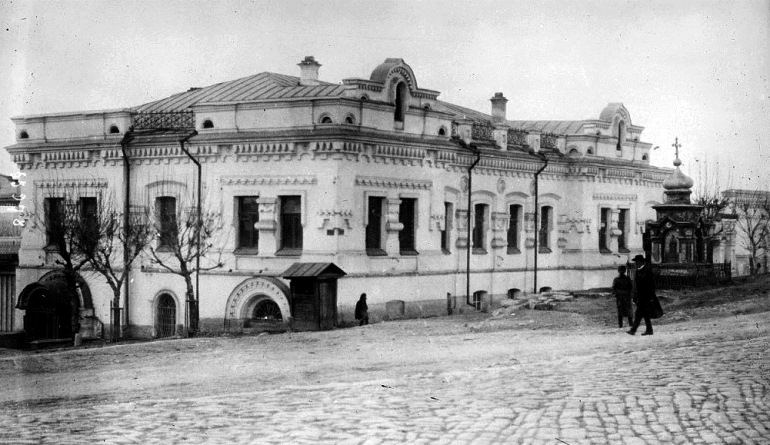
Ipatiev house. Photo: perevalnext.ru
Having finished the shooting we had to carry away the corpses, but it was a comparatively long way. Having confirmed everyone was dead, we began to carry them out. It turned out that traces of blood would be everywhere. I commanded to get a piece of cloth and put some of it onto the stretchers and then line the truck with it. When the first corpses were carried away somebody said, I do not remember exactly who it was, that someone had taken some valuables. Then I realized that evidently there were valuables in the things that they had brought with them. I stopped the removal immediately, assembled the men and demanded the valuables should be returned. After some denial, two men returned the valuables they had taken. Comrade Filipp [Goloshchyokin], apparently sparing me (my health was not very good), told me not to go to the "funerals" but I worried very much about disposing of the corpses properly. So I decided to go personally, and it turned out I did the right thing. Otherwise, all the corpses would have got in the hands of the White Guards. It is easy to imagine how they would have exploited the situation.
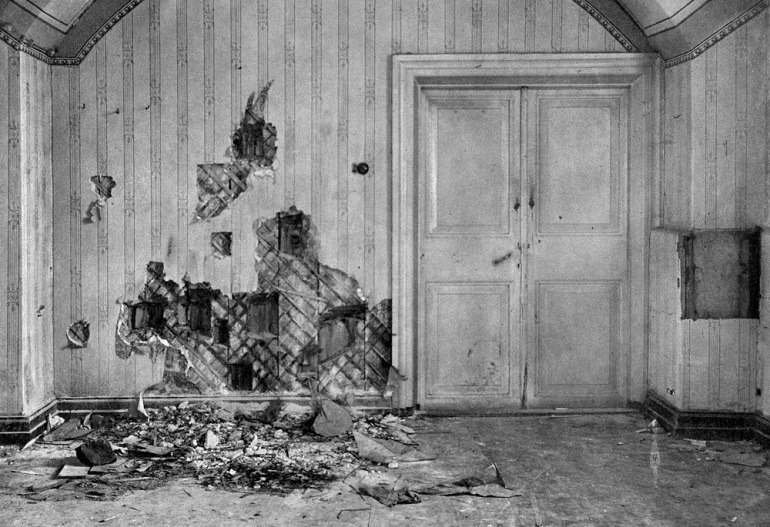
The basement of Ipatiev house where the shooting took place. Photo: magisteria.ru
Having instructed people to wash and clean everything, at about three o'clock or even a little later, we left. I took several men from the internal guards. I did not know where the corpses were supposed to be buried. I hadn’t been there before, so I didn’t know the place. In addition, I think three or four km further, our truck got stuck between two trees. When we stopped several of Yermakov's people started to undo the girls' blouses, more valuables were discovered and the men were taking them. I ordered that men be posted to keep anyone from coming near the truck. The truck was stuck and could not move. I asked Yermakov, "Is it still far to the chosen place?" He said "Not far, beyond railroad beds." Only at daybreak did we come to the famous "gully". Several steps from the mine where the burial had been planned, peasants were sitting around the fire, apparently having spent the night at the hayfield. On the way we met several people. It became impossible to carry on our work in sight of them. We had to cordon the place off at some distance. Apart from that I sent an order to the village to keep everybody out, explaining that the Czech Legion was not far away. Having done all of this I ordered to load the corpses and to take off the clothes for burning, that is, to destroy absolutely everything they had, to remove any additional incriminating evidence if the corpses were somehow discovered. I ordered bonfires. When we began to undress the bodies, we discovered something on the daughters and on Alexandra Feodrovna. I do not remember exactly what she had on, the same as on the daughters or simply things that had been sewed on. But the daughters had on bodices almost entirely of diamonds and [other] precious stones. Those were not only places for valuables but protective armour at the same time. That is why neither bullets nor bayonets got results. So, their dying agony was no one’s but their own fault. All the valuables were ripped out immediately, so that we didn’t have to carry the bloody rags around with us. The valuables were collected, the things were burned and the completely naked corpses were thrown into the mine. It was when a new trouble began. The water just barely covered the bodies, what were we supposed to do? At about 2 in the afternoon I decided to go to the town, because it was clear that we had to extract the corpses from the mine and to carry them to another place. Even the blind could discover them. Besides, the place was exposed for people had seen something had been going on there. I placed some guards to secure the site, took the valuables and left.
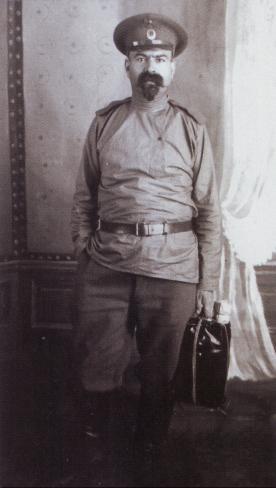
Yakov Yurovsky. Photo: tsushima.su
I went to the town executive committee, to Sergei Yergerovich Chutskayev, who was the chairman at the time to ask if he knew a suitable place. He suggested a very deep abandoned mine on the Moscow high road. I got a car, took someone from the regional Cheka with me, Polushin, I think, and someone else and we left. But one and a half versts away from the appointed place the car broke down. The driver was left to repair it, and we went on foot. We looked over the place and decided it was good provided we could avoid onlookers. Some people lived near the place and we decided to go and take them away to the town and after it was over let them come back. That was our decision. We came back to the car but it needed towing. I decided to wait for a passing car. A while later some people rode up on two horses. I stopped them. The fellows seemed to know me. They were hurrying to the plant. With great reluctance they gave us the horses.
While we were on the way, another plan took shape - to burn the corpses. But nobody knew how to do it. Polushin seemed to say he knew, but nobody really knew how it would come out. I was still considering the mines on the Moscow high road which meant transportation. I decided to get carts. I also thought that in case of failure we could bury them in groups in different places. The road leading to Koptyaki was clay near that gully. If we buried them there without onlookers, not even the devil would find them. To bury them and to drive by with the string of carts would result in a mishmash and that would be that. So there were three plans. We had nothing to drive, there was no car. I went to the head of the military transportation garage to find out if there were any cars. There was a car, but it was the chief's. I forgot his surname; it turned out he was a scoundrel and later he was executed in Perm. Comrade Pavel Petrovich Gorbunov, who is now the deputy chairman of the state bank, was the manager of the garage or deputy chairman of military transportation, I do not remember which. I told him I needed a car urgently. He said "I know what for." He gave me the chairman's car. I drove to Voikov, the head of supply in the Urals, to get petrol or kerosene, sulphuric acid too (to disfigure the faces) and also spades. I commandeered ten carts without drivers from the prison. Everything was loaded on and we drove off. The truck was sent there. I stayed to wait for Polushin, the main "specialist" in burning who had disappeared somewhere. I waited for him at Voikov's. I waited for him in vain until 11 p.m. Then I heard he had been riding a horse to come to me but he had fallen off the horse, hurt his foot, and he could not come. Since we could not afford to get stuck with the car again, I rode a horse at about midnight with a comrade, I don't remember who, to the place the corpses were. But I also had back luck. The horse hesitated, dropped to its knees and pressed my leg against its side. I lay there an hour or more until I could get on the horse again. We arrived late at night. The work extracting [the corpses] was going on. I decided to bury some corpses on the road. We began to dig a pit. At dawn it was almost ready, but a comrade came to me and said that despite the order not to let anybody come near, a man acquainted with Yermakov had appeared from somewhere and had been allowed to stay at a distance. From there it was possible to see some kind of digging because there were heaps of clay everywhere. Though Yermakov guaranteed that he could not see anything, another Comrade (not the one who had spoken to me) began to demonstrate that from where he had stood it was impossible not to see.
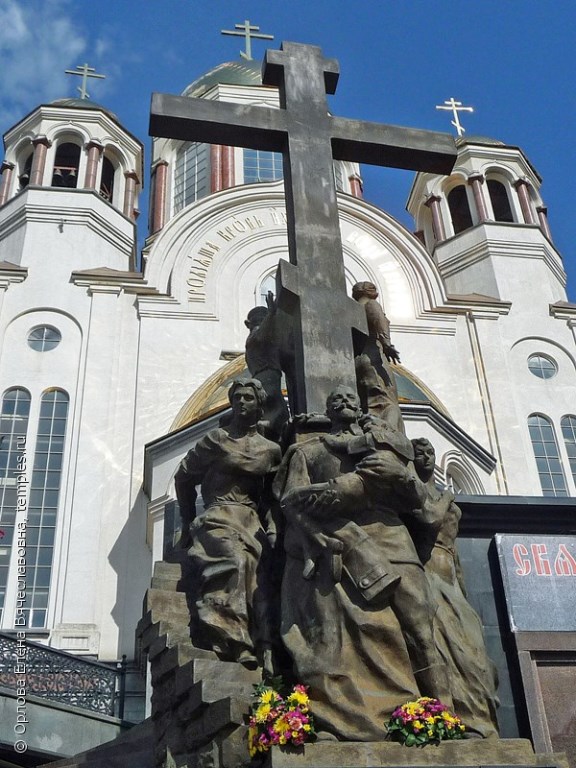
The monument to the Royal Martyrs in front of the Church on the Spilt Blood in Yekaterinburg. Photo: temples.ru
So that plan was ruined too. We decided to fill in the pit. Once the evening came, we loaded the cart. The truck waited for us in a place where it seemed impossible to get stuck. (The driver was Zlokazov's worker Lyukhanov.) We headed for the Siberian high road. Having crossed the railroad, we transferred two corpses to the truck, but it soon got stuck again. We struggled for about two hours. It was almost midnight. Then I decided to do the burying somewhere around there, because at that late hour nobody actually could see us. Only the watchman of the passing track saw several men, because I sent for ties to cover the place where the corpses would be put. The explanation for needing ties was that the ties had to be laid for a truck to pass over. I forgot to say that we got stuck twice that evening or, to be precise, that night. About two months ago, I was looking through the book by Sokolov, the preliminary investigator of the extremely important cases under Kolchak, when I saw a photo of those stacked ties. It was mentioned that the ties had been laid there to let a truck pass. So, having dug up the entire area, they did not think to look under the ties. It is necessary to say that all our men were exhausted. They did not want to dig a new grave. But as it always happens in such cases, two or three men started working, then the others joined. A fire was made and while the graves where being prepared we burned two corpses: Alexei and Demidova, who was mistaken for Alexandra Feodorovna. The pit was dug near the fire. The bones were buried, the land was leveled. A big fire was made again and all the traces were covered with ashes. Before putting the other corpses into the pit we poured sulpheric acid over them. The pit was filled up and covered with the ties. The empty truck drove over the ties several times and rolled them flat. At 5 - 6 o'clock in the morning, I assembled everybody and stated that the important work was completed. I warned everybody to forget the things they had seen and told them never speak about them with anybody. Then we went back to the town. Having lost us, Comrades Isay Rodzinsky, Gorin and somebody else arrived when we had already finished everything. In the evening of the 19th I went to Moscow with my report. I handed the valuables over to Trifonov, the revolutionary committee member and I think Beloborodov, Novoselov and somebody else hid them in the basement of a worker’s house in Lysva. In 1919 when the Central Committee group went to the freed Urals to establish the Soviet rule there I went there too, so Novoselov and someone else I don’t remember retrieved the valuables, while Kerensky took them back to Moscow.
In Perm, where I examined the ex-tsar’s belongings, a great number of valuables was discovered again, which had been hidden everywhere, including their underwear.
Russkiy Mir

